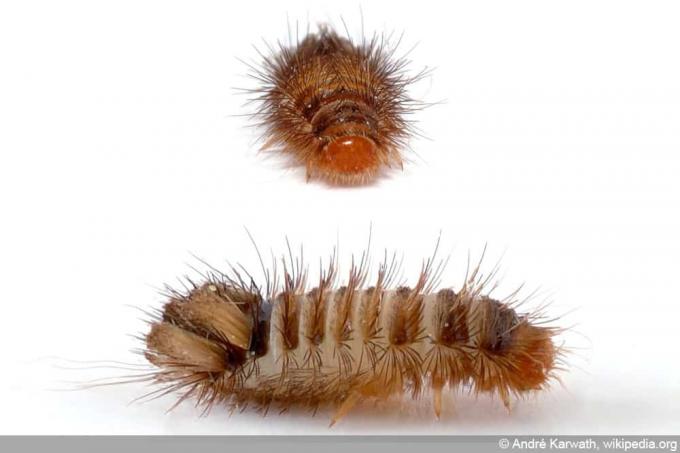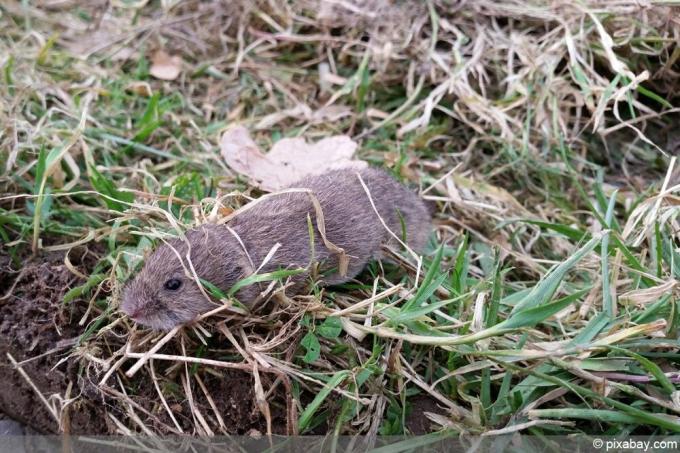

Table of contents
- Possible damage
- Causes of an infestation
- immediate measures
- Prevent future infestations
Ants like to migrate indoors from the garden because they can find food and shelter there. They penetrate through cracks and can create nests in walls, which damages them.
Possible damage
The experts at destroying houses are termites, which are related to ants. Our native ants cause far less damage, but an infestation should not be underestimated. If nothing is done against ants and they nest permanently in the masonry, this can even have a negative effect on the statics.
Potential damage caused by ants includes:
- Decomposition of wall material
- Destruction of wooden components
- Attrition of insulating materials
- Reduction in the load-bearing capacity of wooden beams
- moisture and mold
If ants are discovered in the masonry, the damage is usually very extensive. The reason for this is that the insects go unnoticed for a long time due to their size. Often there are only small heaps of dust around walls. This is a first warning sign that the insects may be living in the wall.
Causes of an infestation
The causes of ants in masonry are very simple, because they look for safe accommodation there and find more than enough food in the house. Especially in years when it is very rainy, for example, or when there is little food for them in nature, they prefer to enter houses.
Tip:
If you find that ants are already starting to build nests in the garden near the house, relocate them. The greater the distance between a nest and the house, the less likely the ants will occupy the brickwork.
immediate measures
If you have found an infestation in the masonry, you should immediately take measures against the insects. Often it is not necessary to use insect repellent against ants, which are actually useful. Simple measures and proven home remedies can also help.
How to deal with ants:
- Seal openings in the masonry
- Replace leaking seals
- Check walls for moisture and take countermeasures
- Interrupt existing ant trails
- Eliminate food sources in the home
Even if you have food sources, and that includes garbage disposal areas or the feeding bowls from pets, does not stop the insects from seeking new sources around the house seek. Therefore, it is also important to chase them away with suitable means. The advantage is that ants react very strongly to some smells. This is a very good way to break up roads and you can use it to drive insects out of the wall.
Ants do not like the following:
- Cinammon
- vinegar water
- Essential Oils (Lemon, Lavender, Peppermint)
- cucumber peels
- sulfur
A notice:
You should refrain from using agents such as baking powder or baking soda, as this can result in the painful death of the insects. If the infestation is so severe that you cannot be scared off, you should contact a specialist.
In addition to scents that ants dislike, they also react to chalk or baby powder. Both contain talc, which the insects avoid because it would damage the antennae or Glue airways. Therefore, you usually do not cross a drawn line with these means. Once you have chased away the ants, check the masonry for damage. If necessary, after an ant infestation, remedial measures may be necessary to remove mold or replace destroyed elements.
Prevent future infestations
In order to protect yourself from insects in the house, you should primarily ensure that the masonry is tight. In general, it is worth checking joints and seals at regular intervals, because they not only offer insects an open door, but energy is lost as a result, which increases your heating costs. A single ant does not make up an entire nest in the house, but the insects send out scouts who go in search of food. If you see a single ant in the house, move it outside immediately.

Ants are always a risk around the house. If you create retreats for the insects in the garden, they will settle there and not even get close to the walls. Nests in unfavorable places should be relocated quickly.
 Home editorial office
Home editorial office
Learn more about home pests

Red maggots / larvae in the apartment: what to do?
Red maggots in your own home are the ultimate nightmare sight. A few crippling seconds of shock are allowed. But then decisive and effective action must be taken to make them disappear. But who exactly is "the red enemy" and how is the fight fought?

Compost bin powder against maggots: this is how it works
Especially in the warm season they can hardly be avoided: maggots in organic waste. In addition to insecticides, there is a far better way to keep the annoying guests away: powdered organic waste bins. We tell you how to use it and how it works.

Combat earwigs | 5 remedies against earworms in the apartment
Although earwigs, Dermaptera in Latin, are completely harmless and actually useful animals, the insects are still a cause for panic for many people when they appear in the apartment. Here you can find out how to get rid of the unloved crawlers.

Identify and fight fleas in the home
Even the thought of fleas in the home is uncomfortable. After all, we associate uncleanliness with annoying insects. They are considered carriers of dangerous diseases. Where are you from? What are the signs of a flea infestation? How do you get rid of them?

Fighting maggots on the ceiling | 7 tips for all rooms
Bedroom, kitchen or pantry, wall or ceiling - anyone who discovers maggots in the house wants to get rid of them quickly. With our help, you can do it quickly and without professional pest control.

Fighting mice in the garden 8 tips against mouse holes
Suddenly the earth sags and the roots of the vegetable plants are bare? Then there is a high probability that mice have nested in the garden. Although the rodents cause a great deal of damage in the beds and on the lawn, the gardener is just as reluctant to kill them. Biological measures are the solution, because mouse holes can also be fought without chemicals.
